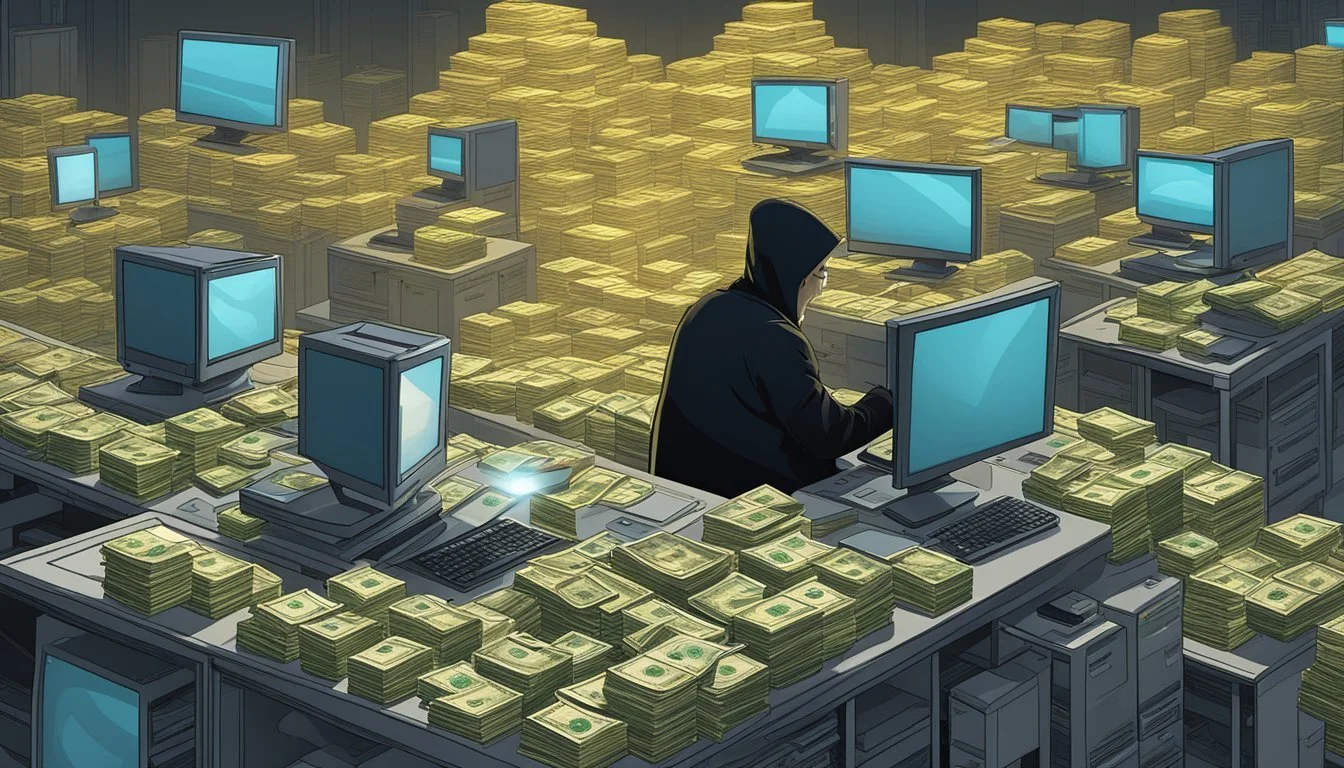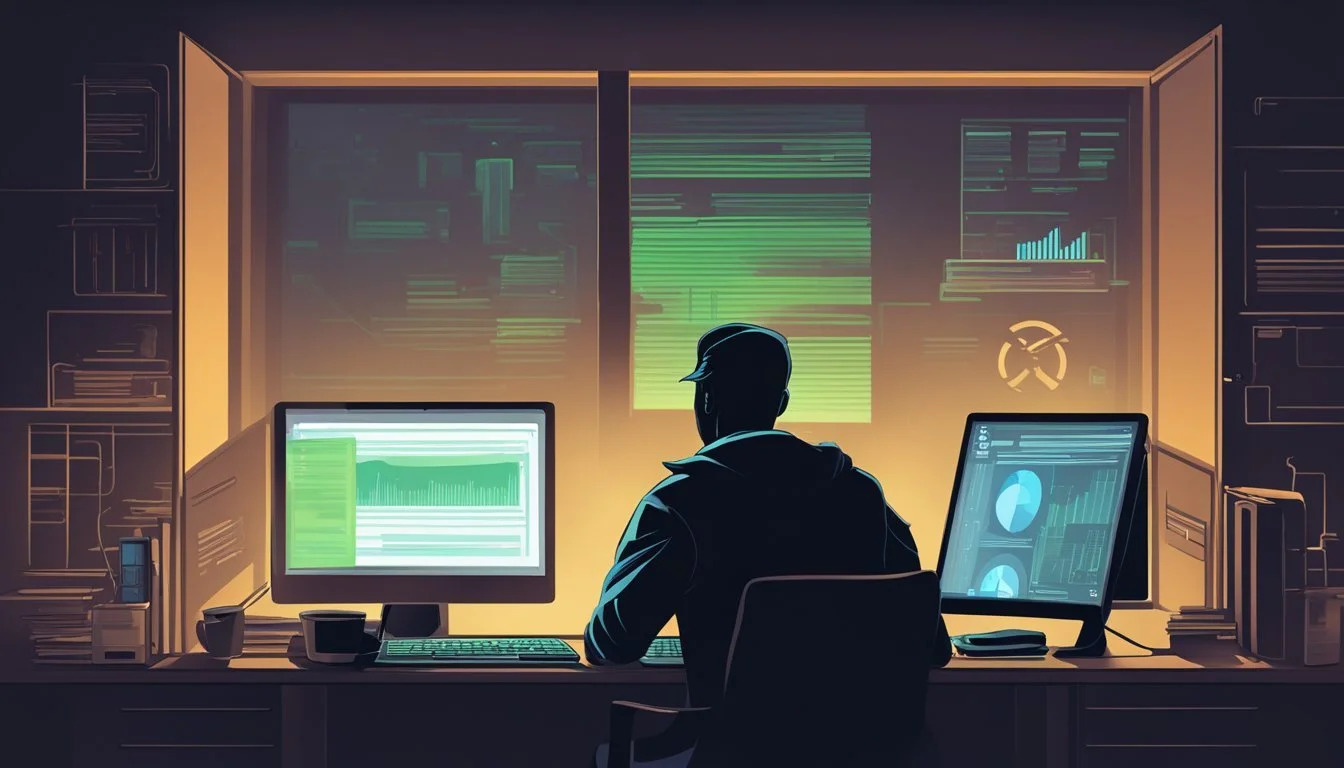6 Eye-Opening Documentaries on Dark Web Marketplaces and Cybercrime
Unveiling the Digital Underworld
The dark web has become a focal point for cybercrime and illicit online marketplaces in recent years. As law enforcement agencies work to combat these shadowy digital realms, documentaries have emerged to shed light on the inner workings of dark web operations and the efforts to shut them down.
These documentaries offer viewers unprecedented access to the hidden world of cybercrime, exploring everything from drug trafficking to state-sponsored hacking. By examining real cases and featuring interviews with investigators, former criminals, and cybersecurity experts, these films provide valuable insights into the evolving landscape of online criminal enterprises and the challenges of policing the internet's darkest corners.
1) "The Creepy Line" by Matthew Taylor
"The Creepy Line" is a 2018 documentary directed by M.A. Taylor that explores the influence of tech giants Google and Facebook on society. The film delves into how these companies manipulate user data and public opinion on a massive scale.
Taylor's documentary reveals the sophisticated methods employed by Google and Facebook to shape online experiences and influence people's thoughts and behaviors. It examines the extent to which these platforms can mold public consciousness through their algorithms and data collection practices.
The film features insights from experts and researchers who shed light on the potential dangers of unchecked power wielded by these tech corporations. It raises important questions about privacy, data control, and the impact of technology on democracy.
"The Creepy Line" serves as a wake-up call for viewers, encouraging them to critically examine their relationship with technology and consider the implications of sharing personal information online. The documentary aims to spark discussions about digital ethics and the need for greater transparency in the tech industry.
2) "Deep Web" by Alex Winter
"Deep Web" explores the hidden corners of the internet, focusing on the Silk Road marketplace and its creator Ross Ulbricht. Directed by Alex Winter, this documentary delves into the complex world of dark web marketplaces and their impact on society.
The film examines the rise and fall of Silk Road, which became notorious for facilitating anonymous drug transactions. It presents interviews with key figures involved in the case, including law enforcement officials and Ulbricht's family members.
Winter's documentary raises important questions about privacy, internet freedom, and government surveillance. It provides a balanced look at the ethical implications of dark web markets and the motivations behind their creation.
"Deep Web" offers viewers a glimpse into the technological underpinnings of these hidden online spaces. It explains concepts like Tor networks and cryptocurrency in accessible terms, helping audiences understand the mechanics of dark web operations.
The film also touches on broader issues surrounding digital rights and the future of internet governance. It encourages viewers to consider the complex relationship between personal privacy and public safety in the digital age.
3) "Dark Net" by Mati Kochavi
"Dark Net" is a documentary series created by entrepreneur Mati Kochavi and produced by Vocativ Films. The show explores the hidden corners of the internet, shedding light on cybercrime and dark web activities.
Each episode of "Dark Net" delves into different aspects of the digital underground. It examines topics such as illegal online marketplaces, cryptocurrency, and cyber warfare.
The series premiered on Showtime and has aired for multiple seasons. It features interviews with experts, law enforcement officials, and individuals involved in various dark web activities.
"Dark Net" aims to educate viewers about the complexities and dangers of the deep web. It presents real-life stories and case studies to illustrate the impact of cybercrime on individuals and society.
The documentary series has garnered attention for its in-depth exploration of digital privacy issues and emerging technologies. It offers a balanced perspective on the benefits and risks associated with the dark web.
4) "Zero Days" by Alex Gibney
"Zero Days" is a compelling documentary that explores the world of state-sponsored cyber warfare. Directed by Alex Gibney, the film premiered at the Berlin International Film Festival in 2016.
The documentary focuses on the Stuxnet computer virus, a sophisticated malware allegedly created by the United States and Israel. This cyber weapon was designed to sabotage Iran's nuclear program.
Gibney's film offers an in-depth look at the development and deployment of Stuxnet. It features interviews with intelligence officials and cybersecurity experts who provide insights into this covert operation.
"Zero Days" raises important questions about the ethics and implications of cyber warfare. It examines how nations are increasingly using digital tools as weapons in geopolitical conflicts.
The documentary received praise for its thorough investigation and eye-opening revelations. It sheds light on a largely hidden aspect of modern warfare that has far-reaching consequences for international relations and security.
5) "Terms and Conditions May Apply" by Cullen Hoback
"Terms and Conditions May Apply" explores the hidden world of online privacy and data collection. Directed by Cullen Hoback, this documentary sheds light on how major tech companies gather and use personal information.
The film features interviews with privacy experts, activists, and technology industry figures. It examines the practices of companies like Facebook, Google, Amazon, and Apple in collecting user data.
Hoback's documentary reveals how seemingly innocuous terms of service agreements often allow extensive data mining. It shows how this information can be shared with advertisers, law enforcement, and government agencies without users' knowledge.
The film raises important questions about digital privacy rights and the true cost of "free" online services. It demonstrates how personal data has become a valuable commodity in the digital age.
"Terms and Conditions May Apply" serves as a wake-up call for internet users. It encourages viewers to consider the implications of rapidly clicking "agree" on online contracts.
6) "The Internet's Own Boy: The Story of Aaron Swartz" by Brian Knappenberger
This documentary chronicles the life and untimely death of Aaron Swartz, a brilliant programmer and internet activist. Swartz was a tech prodigy who co-founded Reddit and helped develop RSS feeds.
The film explores Swartz's dedication to free information and his efforts to make academic journals openly accessible. His actions led to legal troubles when he downloaded millions of articles from JSTOR, a subscription-based academic database.
Knappenberger's work sheds light on the clash between Swartz's ideals and powerful corporate and government interests. It raises questions about information access, copyright laws, and the boundaries of digital activism.
The documentary portrays Swartz as a visionary who challenged the status quo of information control. It details his legal battles and the mounting pressure he faced from federal prosecutors.
Tragically, Swartz took his own life at age 26 while facing potential jail time. The film examines the circumstances surrounding his death and its impact on debates about internet freedom and ethics in the digital age.
Understanding the Dark Web
The dark web is a hidden part of the internet inaccessible through standard search engines. It requires specialized software like Tor for access and enables anonymous communication and transactions.
What Is the Dark Web?
The dark web is an encrypted network of websites not indexed by regular search engines. It uses tools like The Onion Router (Tor) to mask user identities and locations.
This anonymity attracts both legitimate and illegal activities. While it provides privacy for dissidents and whistleblowers, it also harbors illicit marketplaces.
Dark web sites have .onion domains and require specific software to access. The encryption makes it difficult to trace users or shut down illegal operations.
How Dark Web Marketplaces Operate
Dark web marketplaces function like underground eBays for illegal goods and services. They use cryptocurrencies like Bitcoin to facilitate anonymous transactions.
Popular items sold include drugs, weapons, stolen data, and hacking tools. Buyers and sellers use pseudonyms and encrypted messaging to communicate.
Site administrators take a cut of sales and enforce basic rules. However, scams and law enforcement stings are constant risks for users.
Marketplaces come and go as they face shutdowns and competition. The fall of Silk Road in 2013 spawned numerous successors vying for market share.
Cybercrime Networks
Cybercrime networks operate in the shadows of the internet, employing sophisticated tactics to carry out illegal activities. These organizations range from small groups to large-scale syndicates with global reach.
Notorious Cybercrime Organizations
The Russian Business Network (RBN) gained infamy in the mid-2000s for its involvement in various cybercrimes. This organization provided hosting services for illegal activities, including phishing, malware distribution, and identity theft.
Carbanak, also known as Anunak, targeted financial institutions worldwide. This group used spear-phishing emails to infiltrate bank networks and steal millions of dollars.
The Lazarus Group, believed to be North Korean state-sponsored hackers, gained attention for high-profile attacks. Their targets included Sony Pictures in 2014 and numerous cryptocurrency exchanges.
Tactics Used by Cybercriminals
Cybercriminals employ a range of techniques to achieve their goals:
Phishing: Sending deceptive emails to trick victims into revealing sensitive information
Malware: Developing and deploying harmful software to infiltrate systems
Ransomware: Encrypting victims' data and demanding payment for its release
Social engineering: Manipulating individuals to divulge confidential information
Advanced Persistent Threats (APTs) involve long-term, targeted attacks on specific organizations. These campaigns often use custom malware and exploit zero-day vulnerabilities.
Botnets, networks of compromised computers, are used for various malicious activities. These include Distributed Denial of Service (DDoS) attacks and large-scale spam campaigns.






